|
April 26, 2000
Full e-Texas Commission Meeting
Members Present
Dr. Wendy Gramm (chair), Hector De Leon, John Fainter, Bill Hammond, Dr. Tom Saving, Charles Miller, Sonny Messiah-Jiles
Executive Summary
The commission met at the LBJ School of Public Affairs to hear reports from the Education, Workforce and Health and Human Services task forces, along with presentations from experts in each of those areas. Comptroller Rylander gave a presentation on "Helping Schools Make Technology Work."
Discussion
After welcoming remarks and introductions by Dr. Gramm and Comptroller Rylander, Commissioners Miller (education), Messiah-Jiles (workforce) and Saving (health and human services) gave overviews of issues being considered in their task forces. Miller was followed by Mary Ann Ward, founder of Schools at Work, and Darcy Hardy, director of the University of Texas TeleCampus. Messiah was followed by Dr. Sharon Green of Motorola University. Saving was followed by Merrill Matthews, Institute for Policy Innovation, and Dr. Tom Ferguson, University of Texas Health Science Center - Houston.
Miller said the education task force is researching "doable" recommendations and has identified general trends. Changing demographics; teacher training; shortages of math, science, bilingual and special education teachers; rapid technological change, and accountability are all challenges facing education. He said the task force recognizes opportunities for educational entrepreneurship. He said the linkage between K-12 and higher education must be improved, there should be choices in public education, and higher education should be deregulated.
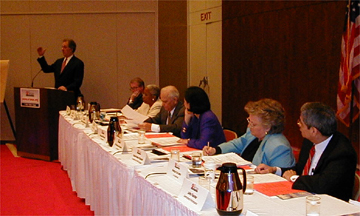
|
|
E-Texas Commissioner Charles Miller led the Education Task Force presentation to the commission. (From back to front: Commissioner Charles Miller, Deputy Comptroller Billy Hamilton, Commissioner Sonny Messiah-Jiles, Commission Co-Chair Wendy Gramm, Comptroller Rylander and Commission Co-Chair Hector De Leon.)
|
Ward described the trend for corporations to build public schools for their employees' children. The benefits to the corporations include employee recruitment and retention, morale, less absenteeism, and the fulfillment of a desire to help school districts. School districts benefit by reducing overcrowding, cost savings and improved standardized test scores. Students benefit by achieving higher academic standards, increased parental involvement, and a higher level of racial and socio-economic diversity.
Hardy said the UT TeleCampus provides on-line distance education to students at UT component campuses. She described a number of myths associated with on-line learning. The UT school, which began operation last fall, has 150,000 students, 8,500 faculty and eight programs. Currently there are three graduate degree programs on-line, which will be increased to five next fall. There are seven general education courses, to be increased to nine. She said the school features collaborative programs and funding among the component campuses, an array of student support services including virtual libraries, a shared faculty and course development, cross-system admission and registration, a common tuition and fee structure, and common accreditation.
Comptroller Rylander gave a presentation on "Helping Schools Make Technology Work" based on findings in 30 Texas School Performance Reviews. The top 10 ways to make technology work for schools include: develop long and short-range plans and budgets; create policies, procedures and standards; know what you need before you buy it; apply the "Yellow Pages test" when deciding to buy or rent expertise; locate funding to fill growing needs; make sure computer systems are compatible, understand that training is the key to success or failure; communicate and cooperate, inside and outside the district; keep systems up and running with staffing and technical support; and control inventory.
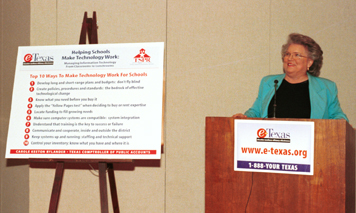
|
|
Comptroller Carole Keeton Rylander presents the "Top 10 Ways to Make Technology Work for Schools."
|
Messiah-Jiles, discussing workforce issues, said most of today's jobs do not require higher education. Sixty percent of workers receive on-the-job training, 33 percent have some post-secondary training, and 7 percent rely on work experience. Most public funding for workforce programs comes from the federal government (82 percent) with most workforce expenditures going toward low-income people. She said private industry spends the most on workforce development, $180 billion, which has tripled in five years. She said the new Texas worker has the following characteristics: possesses greater skills, is older, works more years and longer hours, is more apt to change jobs more frequently, insists on flexible work arrangements, offers greater diversity and contact with world cultures, and is paid for value added to business rather than seniority. New strategies should include creative partnerships, critical thinking skills, better literacy programs, timely information, wide distribution such as training over the Internet, and greater coordination.
Green of Motorola described the company's worldwide employee training program. Motorola University uses a broad-based approach which includes participation in all levels of education, business and education partnerships, and internal alignments. She said workforce development is Motorola's most critical business issue and has made a long-term commitment to education and workforce development.
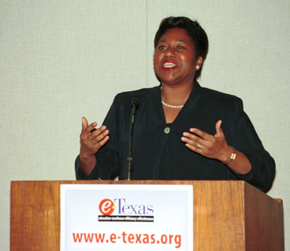
|
|
Dr. Sharon Knotts Green, Director of Strategic Education and Workforce Alliances, Motorola University, served as one of the presenters for the Workforce Task Force. Her topic was "The Knowledge Supply Chain: Ensuring a Skilled Workforce."
|
Commissioner Hammond commented that the federal government should either give states block grants for workforce development or get out altogether. Too many federal requirements keep too much federal money from actually going to job training.
Dr. Saving, discussing healthcare, focused on insurance. He said 25 percent of Texas have no health insurance. Most of those are young, who are healthier and cannot afford insurance. He said changing demographics will increase pressure on the healthcare system. The health and human services task force is exploring ways to increase participation in healthcare by providing vouchers for some services, and medical savings accounts which allow participants to keep any unspent funds. He said states should work together to lobby against federal mandates, programs should be consolidated and Internet access should be increased.
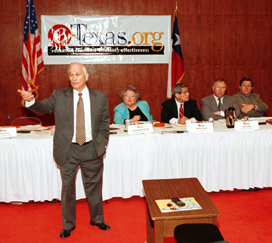
|
|
E-Texas Commissioner Dr. Tom Saving introduces the presentation given by the Health and Human Service Task Force. (Left to right: Dr. Saving, Comptroller Rylander, Commission Co-Chair Hector De Leon, Commissioner John Fainter and Commissioner Bill Hammond.)
|
Matthews discussed market-driven healthcare. He said healthcare is in the midst of shifting from a system designed for the industrial age to one evolving for the information age. During the industrial period, he said, healthcare revolved around the doctor, who possessed all information. Patients, hospitals, technology, insurance companies and the government all based decisions on the doctors' opinions. Beginning in the 1970s, insurers clamped down and, in cooperation with employers, began managed care to remove some authority from doctors. Today, patients want to manage their own health care. With increased access to knowledge from all communications sources, patients are taking more control over the healthcare system.
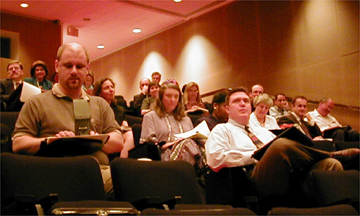
Dr. Tom Ferguson, UT Health Science Center - Houston, agreed and offered four recommendations: find ways to provide self-care access to medical records, x-rays, and hospital ratings; create a self-help clearinghouse which would refer individuals to self-help groups, help children grow up with medical knowledge; and create technical support centers to help the healthcare industry make the information age transition.
|

